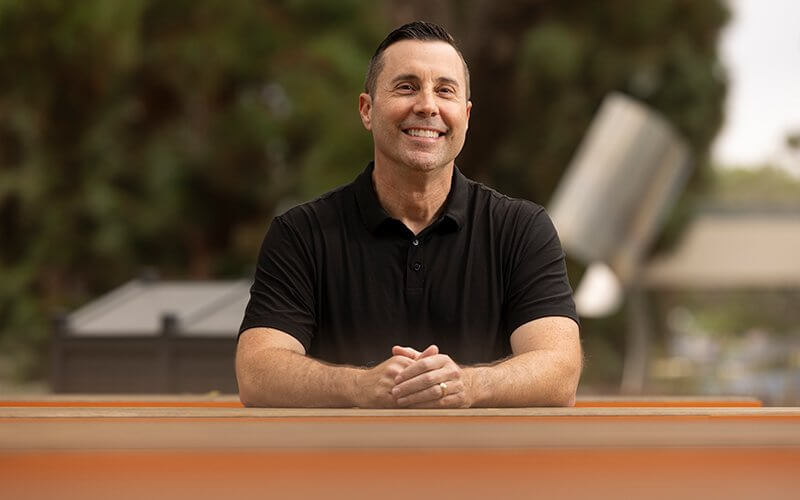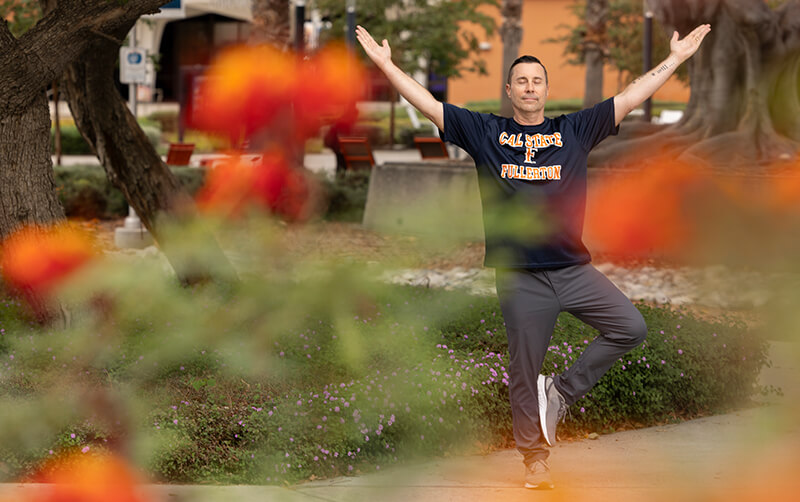
During his 27-year teaching career, Cal State Fullerton alum Jason Euston, admittedly, has grappled with teacher burnout.
“I experienced my own bout with burnout as I struggled to balance my teaching workload with graduate studies and family health issues,” said Euston, a teacher at Valley View High School, a continuation school in Ontario.
With that self-realization, Euston’s capstone research project for his graduate program in the College of Education focused on teacher wellness and well-being.
”Diving into the research turned out to be both cathartic and enlightening. It helped me see that what I was experiencing was part of a larger pattern among educators, and that I wasn’t alone in facing those challenges,” he said.
Euston chose CSUF’s master’s degree program in transformative teaching in secondary education to advance his work of advocating for the emotional well-being of teachers and students.
Plus, the flexibility of the fully online, 21-month program was appealing since it’s designed with full-time teachers in mind.
“The graduate program reminded me of my ‘why’ and renewed my purpose. It energized my teaching and strengthened the impact I can have on students every day,” said Euston, who earned his master’s degree last year.
The veteran educator decided on his research topic since other teachers may be at a breaking point in the classroom.
“Burnout is more than just being tired. It’s a combination of emotional exhaustion, feeling disconnected from students and a loss of accomplishment in one’s work,” Euston said. “When teachers reach that point, it doesn’t just affect them personally, it directly impacts students’ learning, classroom climate and long-term success.”
Euston’s research, recently published in The High School Journal, describes the need for systemic reforms to support teacher well-being.
His article, “From Surviving to Thriving: Rethinking Support for Teachers,” details teacher burnout by pointing to factors such as unmanageable workloads, regular classroom disruptions, inadequate mentorship and a lack of professional autonomy.
“Jason’s unwavering commitment to addressing teacher burnout through both personal reflection and rigorous research exemplifies the kind of transformative scholarship we strive to cultivate in our graduate program,” said Chris Street, professor of secondary education and Euston’s research adviser.

Euston’s article addresses the negative impact of burnout on teachers’ emotional capacity, professional commitment and student learning. He found that teacher stress is often transferred to students, making it harder for them to focus and learn.
To better support teachers, Euston said that schools must enact systemic changes to reduce workloads, provide mentorship, limit classroom disruptions and give teachers more autonomy instead of frequent changes in curriculum and programs.
“Teachers can use tools like mindfulness, self-compassion, exercise and setting healthy boundaries, along with shifting from empathy — taking on students’ emotions — to compassion, which builds resilience,” said Euston, who started teaching yoga to his students and fellow teachers to improve overall well-being.
“When educators are supported with both systemic changes and personal strategies, they gain the energy and emotional capacity to connect deeply with students and help them thrive.”
In 1996, Euston earned a bachelor’s degree in business administration, focusing on accounting, from CSUF. He also completed the credential program to teach business and mathematics at the high school level.
Euston spent his first 10 years teaching at Montclair High School. For the past 17 years, he has taught business, math and physical education at Valley View High School.
He is now working on earning a teacher training certification in yoga. Euston also plans to start a career and technical education pathway, centered on health and wellness.
“The new pathway is a natural next step, and I’m excited to share what I learned in the research with students,” he said.
Euston shared that returning to CSUF gave him the tools to advocate for teacher and student wellness.
“Earning my master’s degree made me a far better teacher than before,” he said.